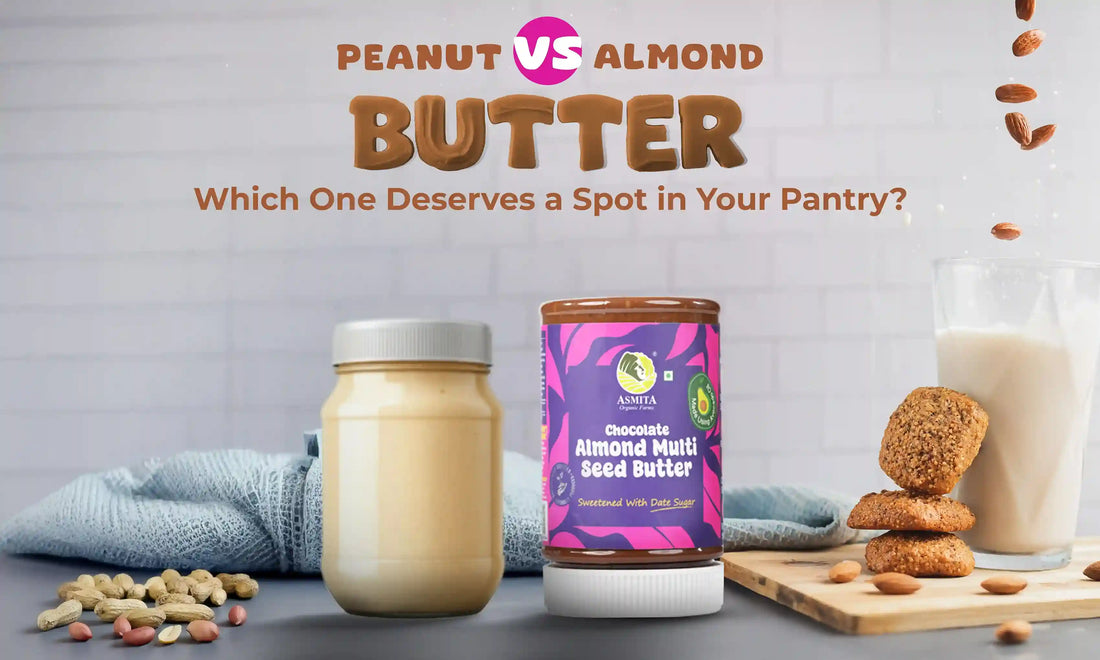Almond Butter vs Peanut Butter: Which Nut Butter is Healthiest?
5 min read
Table of Contents
- Main Ingredients of Almond Butter and Peanut Butter
- Nutrition in 1 Tablespoon of Almond Butter
- Nutrition in 1 Tablespoon of Peanut Butter
- Almond Butter vs Peanut Butter: Health Benefits
- Fat Content
- Protein Content
- Vitamins & Minerals
- Price Comparison
- Which Nut Butter is Good for Kids?
- Bottom Line
Main Ingredients of Almond Butter and Peanut Butter
What’s in Almond Butter?
Ingredients of AOF's Almond Multiseed Butter:
- California Almonds
- Chia Seeds
- Sunflower Seeds
- Pumpkin Seeds
- Flax Seeds
- Date Sugar
- Monk Fruit
- Avocado Oil
- Raw Almond Butter: Organic and unroasted, it retains more of the nutritional value as it has not been roasted before it is processed. It has a very delicate taste that is more earthy but not too overpowering.
- Roasted Almond Butter: Prepared using roasted almonds to enhance its natural nuttiness and create a deeper, richer flavour. Many clean-label brands (like ours) also add wholesome ingredients like vanilla extract, or monk fruit for a touch of sweetness—without compromising on quality. Some may include healthy oils to achieve a smooth, spreadable consistency, while keeping the ingredient list short and nourishing.
What’s in Peanut Butter?
- Natural Peanut Butter: Just peanuts, no weird extras. The downside? It separates over time, so you’ll need to stir it before using it.
- Regular Peanut Butter: Contains added sugar, salt, and oils for a smoother texture and longer shelf life. It’s creamier and sweeter but not as healthy.
Nutrition in 1 Tablespoon of Almond Butter
- Calories: 98 cal
- Fat: 8.9g
- Protein: 3.4g
- Carbohydrates: 3g
- Fiber: 1.7g
- Sugar: 1g
- Vitamins: 3.87mg
- Riboflavin: 0.2mg
- Magnesium: 44.6mg
- Calcium: 55.5mg
- Iron: 0.6mg
Nutrition in 1 Tablespoon of Peanut Butter
- Calories: 96 cal
- Fat: 8.2g
- Protein: 3.6g
- Carbohydrates: 3.6g
- Fiber: 1g
- Sugar: 1.7g
- Vitamins: 1.5mg
- Magnesium: 26.9mg
- Calcium: 7.9mg
- Iron: 0.3g
Almond Butter vs Peanut Butter: Health Benefits
1. Fat Content
- Almond Butter: Almond butter is rich in monounsaturated fats, the same type found in olive oil and avocados. These fats help lower LDL (bad cholesterol) while maintaining HDL (good cholesterol) levels, reducing the risk of heart disease and supporting overall cardiovascular health. Additionally, monounsaturated fats are known to improve brain function, reduce inflammation, and even promote weight management by keeping you fuller for longer.
- Peanut Butter: While it does provide some heart-healthy fats, peanut butter also has higher levels of saturated fats. In excess, saturated fats can contribute to cholesterol buildup in the arteries, increasing the risk of heart disease if not consumed in moderation. However, natural peanut butter (without added hydrogenated oils) still remains a decent source of healthy fats.
2. Protein Content
- Almond Butter: 3.4g of protein per tablespoon
- Peanut Butter: 3.6g of protein per tablespoon
3. Vitamins & Minerals
- Almond Butter: Almond butter is a powerhouse of vitamin E, a potent antioxidant that supports skin health, immunity, and cell repair. It also provides magnesium, which helps with muscle recovery, nerve function, and stress reduction. Plus, it’s packed with calcium, making it a great option for supporting bone health, especially for those who avoid dairy.
- Peanut Butter: While peanut butter has less vitamin E than almond butter, it makes up for it with its B vitamin content. B vitamins, like niacin and folate, are essential for energy production, brain function, and red blood cell formation. It also contains a moderate amount of magnesium, which supports muscle and nerve function.
4. Price Comparison
Which Nut Butter is Good for Kids?
- Allergy Concerns: One of the biggest concerns with peanut butter is that peanuts are a common allergen. Many schools even have peanut-free policies due to the high risk of allergic reactions. If you’re introducing peanut butter to your child for the first time, do so cautiously and watch for any signs of an allergy, such as rashes or difficulty breathing. On the other hand, almond butter is less likely to cause allergies, but since almonds are tree nuts, there’s still a possibility of a reaction. If your child has a tree nut allergy, almond butter may not be a safe choice.
- Nutritional Benefits for Kids: Almond butter contains higher levels of vitamins and minerals, such as vitamin E, calcium, and magnesium, which support bone growth, brain function, and immune health. Meanwhile, peanut butter has more protein and B vitamins, which help with energy production and muscle development.
Peanut or Almond? Better Butter for Kids
Bottom Line
After comparing almond butter and peanut butter, here’s the verdict:
Choose almond butter if you’re looking for more vitamins, heart-healthy fats, and don’t mind spending a little extra for better nutrition.
Choose peanut butter if you want slightly more protein, a lower price point, and that familiar, classic taste.
At the end of the day, both are great options—it all comes down to your health goals, taste preferences, and lifestyle.
But if you’re looking for the ultimate upgrade, choose AsmitA Organic Farms’ Almond Multiseed Butters.
Infused with powerhouse superseeds like chia, flax, sunflower, and pumpkin, each known for their omega fatty acids, essential vitamins, and over 25g of protein per 100g, our butters are made to nourish and satisfy.
Available in Classic and Chocolate flavours, they’re a wholesome, delicious twist on traditional almond butter—perfect for anyone looking to fuel their day the clean way.
For the best organic, high-quality nut butters, explore our Nutty By Nature Collection.
So... which one are you spreading on your toast?






